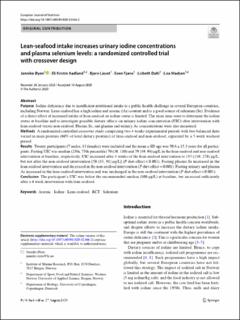| dc.contributor.author | Øyen, Jannike | |
| dc.contributor.author | Aadland, Eli Kristin | |
| dc.contributor.author | Liaset, Bjørn | |
| dc.contributor.author | Fjære, Even | |
| dc.contributor.author | Dahl, Lisbeth | |
| dc.contributor.author | Madsen, Lise | |
| dc.date.accessioned | 2020-10-22T12:55:56Z | |
| dc.date.available | 2020-10-22T12:55:56Z | |
| dc.date.created | 2020-08-31T14:54:06Z | |
| dc.date.issued | 2020 | |
| dc.identifier.issn | 1436-6207 | |
| dc.identifier.uri | https://hdl.handle.net/11250/2684545 | |
| dc.description.abstract | Iodine deficiency due to insufficient nutritional intake is a public health challenge in several European countries, including Norway. Lean-seafood has a high iodine and arsenic (As) content and is a good source of selenium (Se). Evidence of a direct effect of increased intake of lean-seafood on iodine status is limited. The main aims were to determine the iodine status at baseline and to investigate possible dietary effects on urinary iodine concentration (UIC) after intervention with lean-seafood versus non-seafood. Plasma Se, and plasma and urinary As concentrations were also measured. | en_US |
| dc.language.iso | eng | en_US |
| dc.title | Lean-seafood intake increases urinary iodine concentrations and plasma selenium levels: a randomized controlled trial with crossover design | en_US |
| dc.type | Peer reviewed | en_US |
| dc.type | Journal article | en_US |
| dc.description.version | publishedVersion | en_US |
| dc.source.journal | European Journal of Nutrition | en_US |
| dc.identifier.doi | 10.1007/s00394-020-02366-2 | |
| dc.identifier.cristin | 1826273 | |
| cristin.ispublished | true | |
| cristin.fulltext | original | |
| cristin.qualitycode | 1 | |
